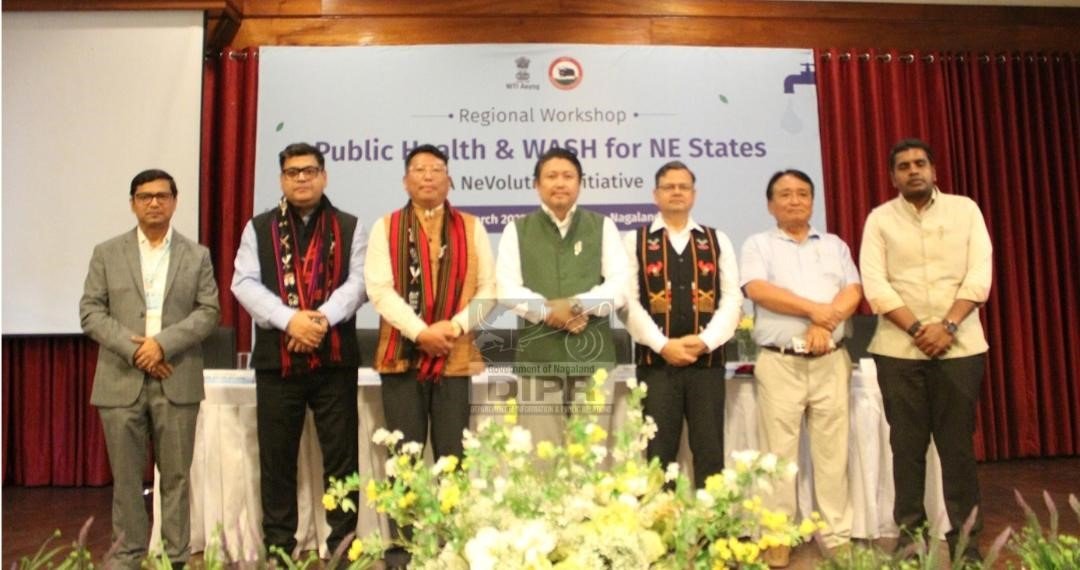In collaboration with NITI Aayog and Government of Nagaland, a Regional Workshop on Public Health & WASH for North Eastern States, a NeVolution initiative was held on 26th March 2025 at Town Hall, Zone Niathu by the Park, Chümoukedima.
The Regional Workshop serves as a crucial platform for addressing the region’s most pressing public health challenges related to water, sanitation, hygiene, and waste management. By fostering cross-sectoral collaboration and community-driven solutions, the workshop aims to support efforts in achieving Sustainable Development Goal (SDG) 6 – Universal access to clean water and sanitation, and improving overall health outcomes across the region. To address these challenges, the Regional Workshop on WASH and Public Health in the North Eastern Region will focus on three key pillars – Swachh North East: Sanitation, Solid & Liquid Waste Management, Swajal North East: Water Quality, Biological & Chemical Contaminants; and Swasth North East: Public Health Implications of WASH. Percentage of households with tap water coverage in NE States till date – Arunachal Pradesh 100% coverage, Assam 81.46%, Manipur 79.59%, Meghalaya 82.01 %, Mizoram 100% , Nagaland 92.76% , Sikkim 91.03 %, and Tripura 85.42%.
Speaking as a special guest at the workshop, Minister, Public Health Engineering Department and Co-operation, Jacob Zhimomi highlighted that out of a total of 3,63,829 rural households in Nagaland, 3,37,498 households or 92.76 % have been provided with Functional Household Tap Connection (FHTC) so far. The State has planned to saturate and provide water supply to the remaining 26,331 households by March 2025. The State has certified 643 or 62.25% villages as Har Ghar Jal, out of 1033 Har Ghar Jal villages reported. Certification for the rest is also in the process. JJM is also being implemented in convergence with Rural Development Department (RDD) under the 15th Finance Commission (15 FC) Tied Grant award. All funds under 15FC Tied Grants are received and utilised by the Rural Development Department.
Download Nagaland Tribune app on Google Play

Zhimomi mentioned that the State plans to saturate all the remaining villages in Nagaland in 2025-26 with Solid Waste Management arrangements in 549 villages, Grey Water Management arrangements in 518 villages, Plastic Waste Management Units in 16 Blocks and Faecal Sludge Management systems in 6 Blocks. The proposed Annual Implementation Plan (AIP) for 2025-26 has a projected cost of Rs. 5566.27 lakh for SBMG, Rs. 3581.866 lakh for FFC Tied Grants and Rs. 5111.40 lakh for MGNREGS. The AIP for 2025-26 has been presented to and vetted by the Department of Drinking Water and Sanitation (DDWS), Ministry of Jal Shakti (MoJS).
Further, Zhimomi pointed that with regard to Aspirational Block Programme, out of 3 (three) Aspirational Blocks, Akuhaito Block in Zunheboto district has attained 100% ODF Plus status. Infrastructures in the other two Blocks have been built, but the progress appears rather low on the IMIS because of rigorous marking system in order to declare a village ODF Plus.
Minister, Rural Development and SIRD, Metsubo Jamir in his address, highlighted the issues concerning the people of the State, where bottlenecks such as lack of adequate infrastructural facilities, poor resources base and general lack of technical know-how has handicapped the NE region, and in particular Nagaland State, in the developmental progress, consequently hampering the goal to achieve the desired level of all round development, especially in the rural areas. The diverse and wide social ethnicity, traditional taboos, topography, geo-physical and agricultural practices of the North Eastern Region poses a great challenge to our great nation in bringing about development to this isolated remote part of our country. He also pointed that, the national programmes for poverty alleviation should be responsive to the local needs and regional peculiar requirements.
Highlights of the programme included the technical session where the key points discussed were Swachh North East: Sanitation, Solid & Liquid Waste Management, Swajal- Drinking water in NE: Water quality, Biological & Chemical Contaminants, Swasth NE: Public Health Implications of WASH. At the inaugural session, ‘Accelerating Public Health (WASH) outcomes: a regional call for action in aspirational districts and blocks’ was delivered by Programme Director, NITI Aayog, Yugal Joshi.

